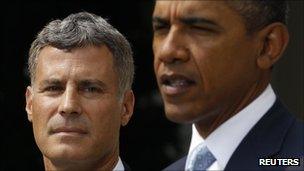Alan Krueger: What's the vision of Obama's new adviser?
- Published
- comments

Alan Krueger's academic publications give only some clues to as to his advice for President Obama
Do you want to know whether female-only rock bands command higher or lower ticket prices, whether poverty creates terrorists, or what makes for daily misery?*
I know the right man.
He is President Obama's new chief economic advisor, Princeton professor Alan Krueger. The Washington Post has an excellent summary of his academic work here, external.
He also worked for the Clinton White House, so he's no stranger to the harsh world he is about to re-enter. I've been trying to figure out the politics of his economics.
It is safe to say the president's pressing concern is not the price of rock-concert tickets. As he and every other politician tell us, creating jobs is the priority.
I can't find anything setting out Mr Krueger's vision.
He seems a small-bore, numbers guy, someone who delights in swallowing data, external and coming to detailed conclusions about specific cases.
Maybe that's just a reflection of the job he has being doing up until now.
The president certainly likes policies backed up by facts. But the Wall Street Journal believes Mr Krueger will promote "aggressive" measures to create jobs, external.
He certainly seems on the conventional left, not believing the minimum wage damages job creation and arguing for more taxation.
Mr Krueger has the interesting idea of a consumption tax in two years' time to stimulate the economy now.
He praises Mr Obama's idea that a failure to agree on budget cuts will trigger automatic ones as "bold, serious, timely", while acknowledging that critics find the president "too slow to engage in major debates and too timid to make difficult decisions".
The last thing he wrote, that I can find, on the jobs crisis, external is mainly about the ways of measuring the size of the labour pool, but it contains the intriguing thought that this is not some passing problem:
"We weren't creating enough jobs long before the recession that began in December 2007. If this pattern holds, even in recovery, it points to a much deeper and disturbing problem for the US economy."
Unfortunately that is where the article ends. Perhaps he will enlighten the president what the real problem is, and even suggest some solutions.
* The answers, according to the professor are "higher" for female rock bands, external, "no" to poverty-created terrorists, external and "commuting" for common misery, external.